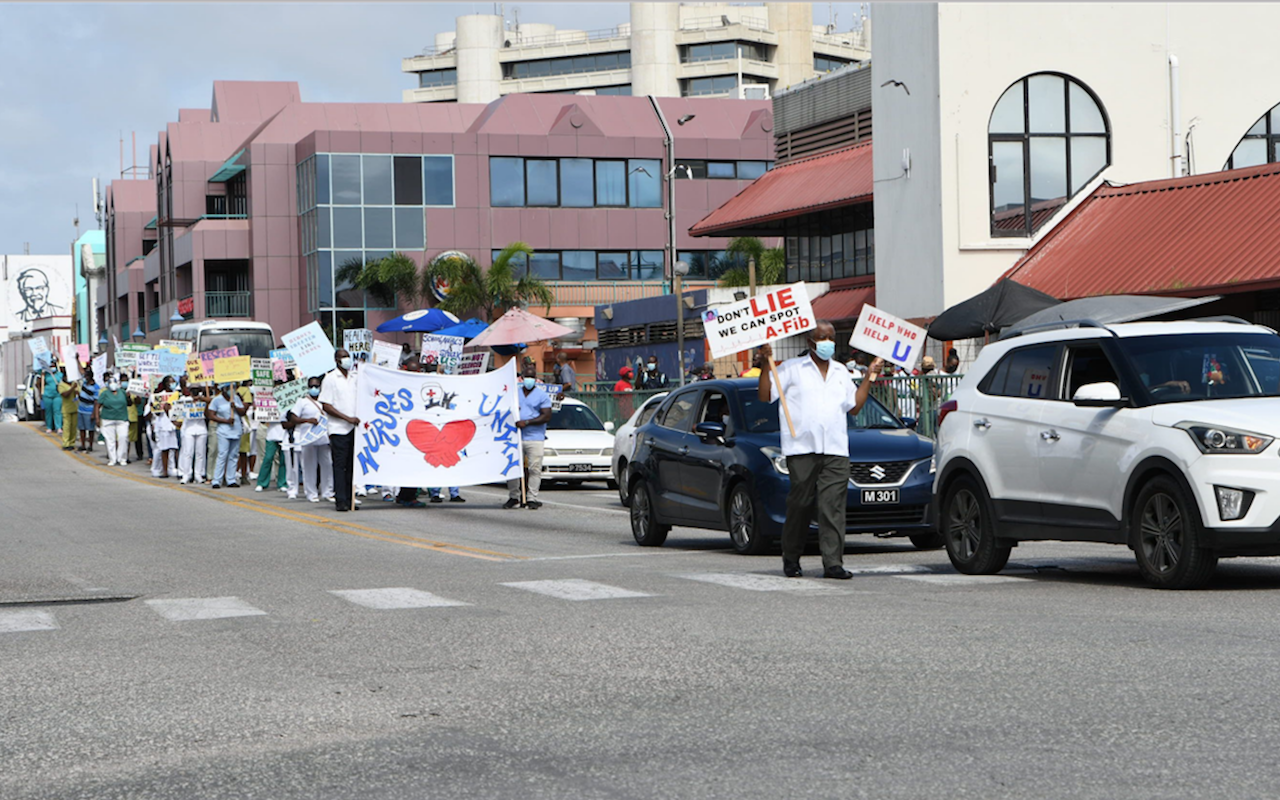Nurses in Barbados Stage Protests Over Working Conditions and COVID-19 Vaccination Mandates

November 29, 2024
Barbados nurses protested poor staffing and working conditions, including mandatory COVID-19 vaccination. Over 100 nurses marched in Bridgetown, demanding fair treatment and safe staffing. Authorities faced criticism for not addressing grievances.
It was not so long ago – three years to be exact – when hundreds of nurses in Barbados took to the streets to protest what they deemed “poor staffing and working conditions”, among other issues.
The straw that broke the camel’s back at the time was the contentious mandatory nasal swabbing or COVID-19 vaccination of nurses, which was to be implemented.
In December 2021, around 300 of the over 1 200 active nurses on the island staged strike action. By January, over 100 represented by the Unity Workers’ Union marched along the streets of Bridgetown with placards in hand, chanting: “All I want to say is that they don’t really care about us.”
Placards read: “Well overworked, severely underpaid”; “If we are essential treat us as such”; “Not all heroes wear capes”, “Invest in nurses and we will do the rest”; and “Safe staffing saves lives”.
The nurses went on to hold several marches after authorities failed to address their grievances.
Those nurses were harshly criticised on social media and on call-in radio programmes, with several persons calling on the healthcare workers to return to their duties.
Still, those brave few stood their ground.
At the time, not only were the nurses’ pay docked but Prime Minister Mia Mottley warned that their action could lead to “an unwarranted and potentially dangerous situation”.
She said at the time: “Are they really prepared to undermine the integrity, also, of an industrial relations system that is based on clearly established protocols that are globally recognised and respected? Our actions today will determine what is permissible conduct in the management of our industrial relations going forward.”
The action did not have the support of the Barbados Nursing Association. Then BNA president Valerie Francis-Miller said the association was adamant that a strike was not the way to resolve issues in the national health service and should have been handled differently.
She told Barbados TODAY: “Have some sit-downs with partners and say what the concerns are and have a positive way forward…and that is not to influence or compromise patient care. As nurses, we have a duty of care. Internationally, striking action is done differently for nurses and the action of all nurses coming out and abandoning patients…. That is not BNA’s nursing nature.”
During a press briefing on Wednesday, BNA President Fay Parris issued a dire warning that the healthcare system is under pressure.
Along with a nursing exodus, she cited unresolved issues, such as unpaid allowances and substandard working conditions, as key factors in the growing dissatisfaction among nurses.
“One area that is causing some unrest at this moment is the lack of uniforms and the non-payment of uniform allowance,” she said.
Additionally, four years after the COVID-19 pandemic, some nurses who worked on the frontline have yet to receive hazard allowances.
“So that is one of the issues that we are also putting on the table so that everybody feels recognised and that they are rewarded for their service,” Parris added.
Saying that the Ghanaian nurses who arrived in Barbados recently were here as a temporary measure, the BNA leader called on the government to address the issues by enhancing nurses’ remuneration and improving working conditions.
The argument back then that nurses striking during the COVID-19 pandemic was not the right time is plausible. We can debate the timing of the strike and protest marches of the disaffected nurses in 2021 and 2022, but what we cannot debate, by BNA’s admission on Wednesday, is that many, if not all the issues raised by those nurses still exist today.
One wonders if the BNA and other unions and medical associations had thrown their support behind those striking nurses if the outcome would have been different.
Maybe there would be no need for BNA to lament as it did Wednesday if the issues raised then were taken more seriously by the powers that be; if at least some of the concerns, such as hazard pay, were addressed; if there was evidence that working conditions were enhanced.
Hopefully, this is a lesson to nurses and other fraternities facing challenges that no matter what, a united front and a strong show of solidarity, will benefit all, not just those who choose to speak up and act.


